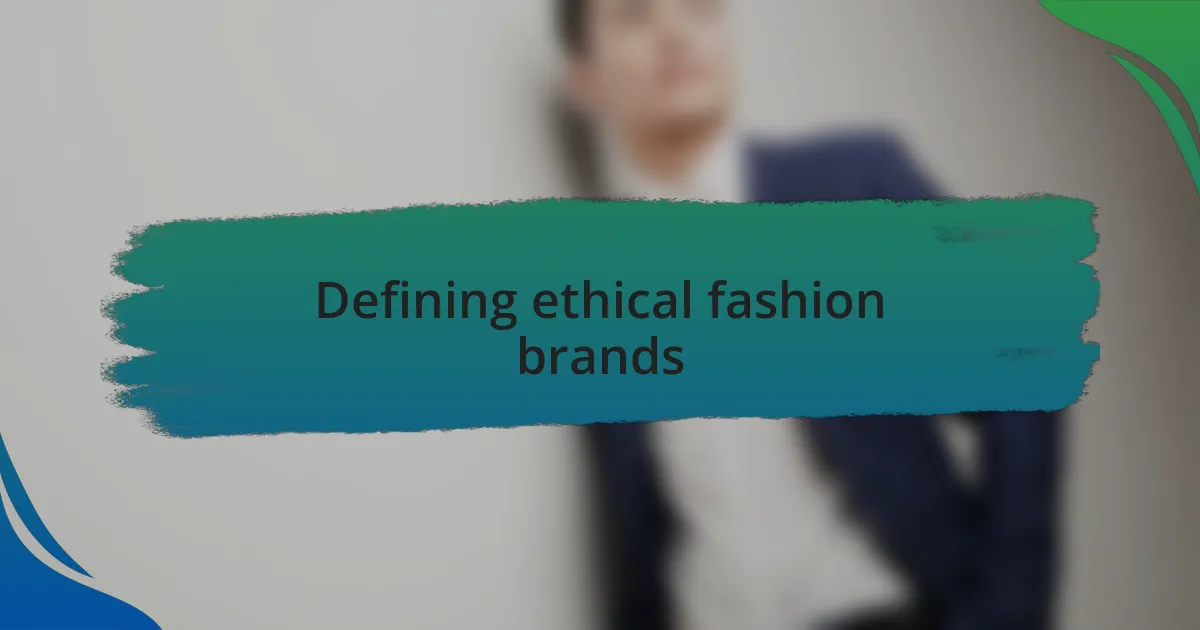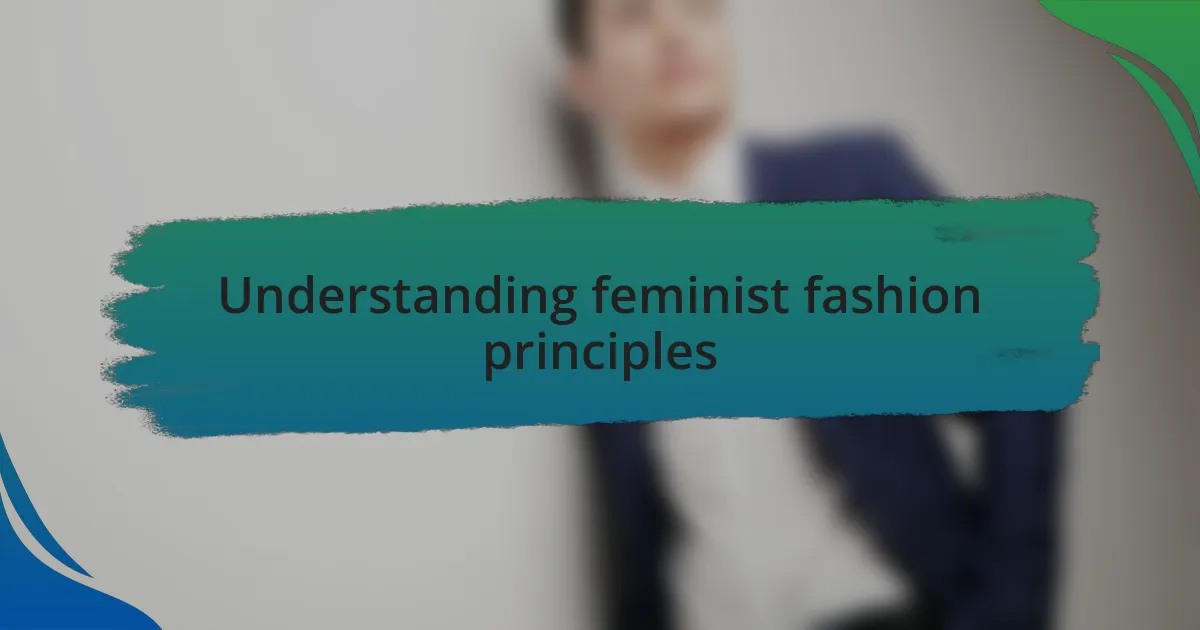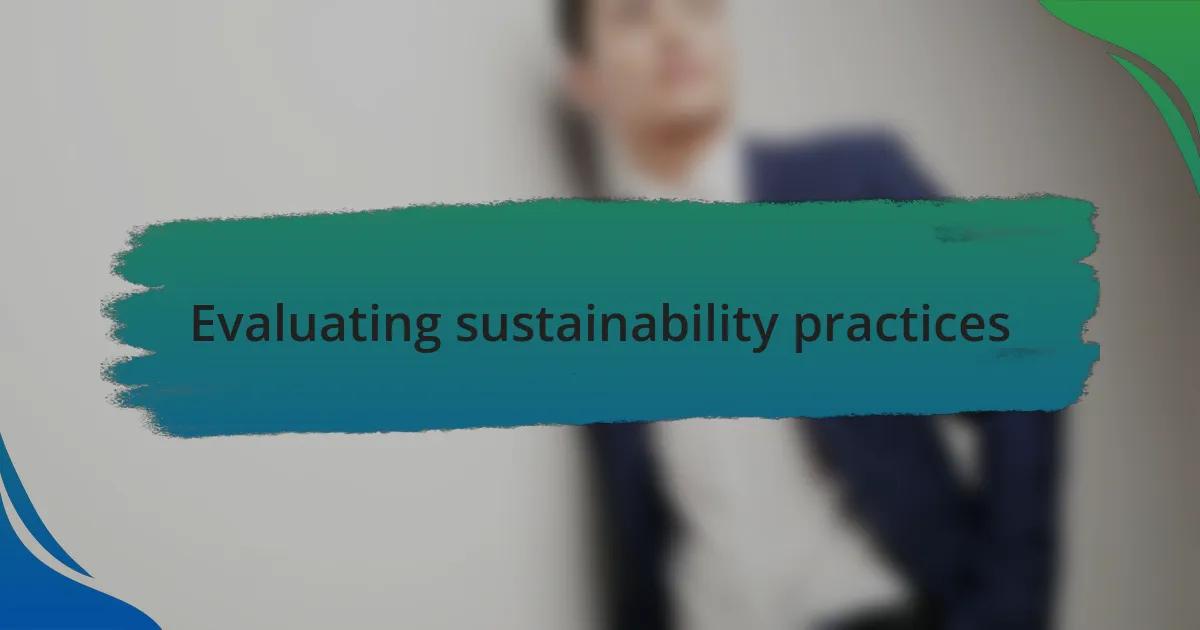Key takeaways:
- Ethical fashion brands prioritize sustainability, fair labor practices, and transparent supply chains to create meaningful connections between consumers and the items they purchase.
- Feminist fashion advocates for inclusivity and empowerment, recognizing the importance of diverse voices and intersectionality in the fashion industry.
- Researching a brand’s ethics is essential for conscious consumerism; third-party resources and transparent practices can indicate a brand’s integrity.
- Evaluating sustainability involves examining material choices, production processes, and waste management strategies to support a healthier planet.

Defining ethical fashion brands
Ethical fashion brands focus on sustainability and ethical production practices that respect both the environment and the people involved in the fashion supply chain. I remember the first time I learned about the impact of fast fashion; it hit me hard. Why should we support companies that exploit workers and harm our planet when there are alternatives that treat both with the respect they deserve?
These brands often emphasize fair labor practices, using organic materials or recycled fabrics, and minimizing waste. I found myself gravitating towards labels that shared stories about the artisans behind their products. It really changed the way I viewed my shopping habits—how can we value clothing that comes with a narrative of care and integrity?
Additionally, ethical brands frequently engage in transparent supply chains, allowing consumers to trace the origins of their clothing. It felt empowering when I could confidently talk about knowing where my garments came from. Aren’t we all seeking connections to the things we wear? Knowing that my choices support fair wages and safe working conditions for artisans gives my purchases a deeper meaning.

Understanding feminist fashion principles
Understanding the principles of feminist fashion often means looking beyond just the garment itself. I recall attending a workshop on sustainable fashion that opened my eyes to the need for inclusivity in every aspect of design. Why is it that the industry often ignores voices of diverse women? Feminist fashion advocates for representation, ensuring that all women, regardless of size, race, or background, have the opportunity to express themselves through clothing.
At its core, feminist fashion emphasizes empowerment and social justice. I remember a particularly moving experience where I met a designer who created clothing for survivors of abuse, transforming their stories into powerful statements through fabric. This reinforced my belief: how can fashion not just be about aesthetics but also about healing and solidarity? It’s this intersection of beauty and activism that fuels my passion for choosing brands that align with these principles.
Moreover, I’ve discovered that part of understanding feminist fashion is recognizing the intersectionality of issues like labor rights, sustainability, and consumerism. I can’t help but think about the impact of my choices on marginalized communities. When I support brands that uphold feminist values, it feels like I’m joining a larger movement, one that champions respect and equality for everyone involved in the fashion ecosystem. Isn’t that what we all aspire to—an industry that reflects our shared values and beliefs?

Researching brand ethics and values
Researching brand ethics and values requires a deep dive into a company’s practices and commitments. I remember scrolling through a brand’s website, excited about their aesthetic, only to find vague statements about sustainability that lacked real evidence. Isn’t it crucial for us, as conscious consumers, to ask ourselves how transparent a brand really is about its sourcing and production processes?
I often turn to third-party resources, like Fair Trade certifications or worker testimonials, to gauge a brand’s integrity. It can be illuminating to see how brands respond to questions about their ethics; those who are proud of their practices will openly share their stories. I felt a wave of reassurance when I found a label that not only showcased their ethical supply chain but also highlighted collaborations with community organizations. Isn’t it empowering to support brands that actively give back to the communities they impact?
Equally important is to look for brands that embody the values they promote. For instance, I once came across a clothing line that claimed to support women’s rights but had a questionable labor history. This contradiction sparked my determination to not just shop based on what feels good but to align my purchases with brands that genuinely stand for the values I hold dear. Wouldn’t you agree that fashion should reflect our beliefs, creating a world that we want to live in?

Evaluating sustainability practices
When evaluating sustainability practices, I often start by examining a brand’s material choices. For instance, I remember discovering a company that used organic cotton and recycled materials. Not only did this impress me, but it also raised the question: how often do we consider the environmental impact of the fabrics we wear?
I also pay attention to a brand’s production process. One time, I learned about a label that prioritized local manufacturing to reduce its carbon footprint. This kind of commitment made me realize the importance of supporting brands that minimize transport emissions. Doesn’t it feel good to know that our purchases can contribute to a healthier planet?
Finally, I think it’s essential to review a brand’s waste management strategy. After reading about a company that implemented a take-back program for their garments, I couldn’t help but reflect on my own consumption habits. Are we not all responsible for what happens to our clothes after we’re done with them? Engaging with brands that prioritize circularity feels like a step in the right direction for ethical fashion.

Personal experiences with ethical brands
In my journey with ethical brands, I vividly recall my first purchase from a sustainable label. I felt a wave of excitement as I unwrapped a dress made from biodegradable fibers. It wasn’t just about looking good; it felt like I was making a statement that resonated with my values. How often do we get to wear something that aligns with our beliefs?
Another memorable experience occurred when I attended a pop-up event showcasing local artisans. I met the creators behind the brand and was struck by their stories of sustainable practices and community involvement. Hearing their passion made me realize that ethical fashion isn’t just about the clothes; it’s about the people and the impact we can collectively make. Doesn’t it feel empowering to connect with a brand on a personal level?
On a different occasion, I tried out a subscription box filled with ethically sourced accessories. While I loved each piece, I was captivated by the detailed information each item came with, explaining the artisans’ stories. This level of transparency deepened my appreciation for the craftsmanship involved. Isn’t it enlightening to know the journey behind each item we own?